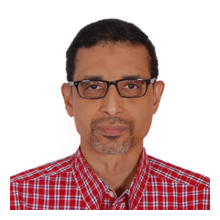For some kids, it’s outer space, for others dinosaurs. But for a Sudanese boy by the name of Gehad el-Ghazali, it was the human body – how it works and why, the cells and circuits, the muscles and blood – that sparked an early interest in science.
 “My father owned a shoe and leather company and he refused to let my brothers and me work with him,” recalled el-Ghazali, now service lead of clinical immunology
at Sheikh Khalifa Medical City in Abu Dubai. “He told us the market is corrupt, and he pushed us to follow our scientific interests and to develop our skills at the highest level.”
“My father owned a shoe and leather company and he refused to let my brothers and me work with him,” recalled el-Ghazali, now service lead of clinical immunology
at Sheikh Khalifa Medical City in Abu Dubai. “He told us the market is corrupt, and he pushed us to follow our scientific interests and to develop our skills at the highest level.”
El-Ghazali did just that, going on to earn his medical degree from Khartoum University Medical School, and later a doctorate in infectious diseases at the University of Stockholm. Along the way, he was drawn to the study of malaria, particularly the immune
response to infection. “The parasite wants to reproduce, and the human body wants to get rid of the parasite,” he says. “And this interaction, this battle for survival, I found very interesting.”
Understanding resistance to chloroquine
El-Ghazali got his start with a group led by the late English geneticist Dr David Walliker. It was 1990, and resistance to chloroquine, long the first line treatment for falciparum malaria, was becoming increasingly widespread. Walliker and colleagues had come to Sudan to investigate an alternative therapy with the potential to replace it, and el-Ghazali, fresh out of medical school, was brought on board.
“We saw many deaths linked to drug resistance,” he says, recalling his first experience in the field. “Patients weren’t responding properly, and I really wanted to understand how this occurs.”
Following another year and a half of fieldwork in Sudan, el-Ghazali made his way to Stockholm to pursue his PhD. There, he delved deeper into the study of immune response to malaria infection under the veteran malaria expert Dr Marita Troye-Blomberg. Yet, as he soon discovered, funding for research was hard to find, and were it not for TDR, he says, his burgeoning career might well have hit a wall.
In 1992, el-Ghazali was able with TDR support to join Troye-Blomberg in The Gambia, where in collaboration with scientists at the Gambia’s Medical Research Council Unit, they investigated the immune response to malaria infection in sets of identical twins. Because twins share the same genes, the researchers were able to compare the extent to which genetic and/or environmental factors are involved in shaping the T-cell system that confers immunity to infection. Their findings were published in the Scandinavian Journal of Immunology.
A scientific career blossoms
Over the next several years, el-Ghazali continued to investigate the ways the immune system regulates different mechanisms to expel the malaria parasite, returning on multiple occasions to conduct fieldwork in Sudan and elsewhere. By the time he earned his Ph.D., he had already made important contributions to the field, and from there began to expand into new domains, including how different genes can influence susceptibility or resistance to infection. “We knew that among people living in the same area, some get mild disease and some get severe disease,” he says. “And the question was, why does this happen?”
We saw many deaths linked to drug resistance. Patients weren’t responding properly, and I really wanted to understand how this occurs.
- Gehad el-Ghazali
El-Ghazali has spent much of his career trying to answer that question, contributing in a variety of ways to research projects in Sudan, Tanzania, and Burkina Faso, many of them supported by TDR. That work has resulted in more than 60 published papers, including many on which el-Ghazali was lead author. “We’ve learned that you can categorize patients based on their genetic backgrounds,” he says. “You can know who is at highest risk, and this can determine how new therapies are developed and delivered.”
“Gehad’s work on immune response and the role of genes in regulating these mechanisms has great improved our understanding of drug resistance,” says Dr Hayder Giha, a professor of biochemistry at the University of Khartoum, who collaborated with el-Ghazali on a number of TDR-supported studies in Sudan. “Not only is he very hard working, but he has the rare ability to lead a research group and to facilitate joint work with other groups.”
In his present role at Sheikh Khalifa Medical City in Abu Dubai, el-Ghazali has applied the knowledge he acquired through his research on malaria to the treatment of immune deficiency. “Some people have a defect in their immune system that makes them more susceptible to infection,” he explains. “So we do the immunological workup and genetic testing.” The sole immunologist in the entire state, el-Ghazali recently oversaw the launch at SKMC of Abu Dhabi’s first ever bone marrow transplant program. He had previously established the same programme at Saudi Arabia’s King Fahad Medical City to support patients with acute leukaemia.
“When I look back on my career, I can say that it was the early support from TDR that has allowed me to get where I am today. And for that I am grateful.”
For more information, contact:
Makiko Kitamura
TDR Communications Officer
Telephone: +41 22 791 2926
email: kitamuram@who.int

